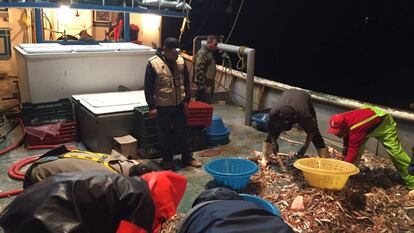Mexico banned from exporting wildlife products for failing to protect vaquita porpoise
The strictest sanction the Convention on International Trade in Endangered Species of Wild Fauna and Flora can apply has only been imposed on six other countries: Somalia, Djibouti, Liberia, São Tomé and Príncipe, Afghanistan and Libya

The Convention on International Trade in Endangered Species of Wild Fauna and Flora (CITES) sanctioned Mexico on Monday for not doing enough to protect the vaquita marina porpoise, the most endangered marine animal in the world. The new sanctions will block Mexico from exporting wildlife products to the 184 member countries of the convention. It will affect 3,148 species of plants and animals, including orchids, cactii and crocodile skin.
The measure — the organization’s most severe — has only been applied to six other countries in the world: Somalia, Djibouti, Liberia, São Tomé and Príncipe, Afghanistan and Libya. The Mexican Foreign Ministry sent a delegation to Geneva on Monday to try to negotiate the sanctions. Meanwhile, environmental organizations are warning that the ban will cause dire consequences.
The vaquita lives in the Sea of Cortez, which is located between the peninsula of Baja California and the coasts of Sonora and Sinaloa. The species is on the brink of extinction: according to studies, there may be as few as eight vaquitas remaining. Its demise is directly related to the totoaba, the largest fish in the Gulf of California. The totoaba’s swim bladder has become a luxury product in China, where it is believed to have aphrodisiac powers. With the fish fetching up to $60,000, the lucrative business has attracted hundreds of illegal fishermen and also organized crime.
The vaquita and the totoaba live in the same territory, meaning all the illegal fishing is taking place in the protected areas where the vaquita is struggling to survive. The marine animal often gets caught up in the gillnets used by fishermen to catch the totoaba, and once entangled, it drowns. The population decline is alarming: in 1997 there were almost 600 vaquitas in the Gulf of California; in 2016 there were 60; just a year later, numbers had fallen by half and, as of 2019, it is estimated there are fewer than 10 vaquitas remaining in the wild. With the animal on the brink of extinction, international organizations demanded Mexico step up efforts to protect it. But so far these calls have produced little results. What’s more, with criminal organizations involved in illegal fishing, it’s become dangerous to try to conserve the species, and many environmental activists in Mexico have been forced to flee the country.
In February, Mexico submitted a plan to combat the illicit trafficking of totoaba, but it was rejected by CITES as “inadequate.” In its sanction notice, the international wildlife body stated the plan lacked “key elements, such as clear timeframes for implementation and achievement of the different steps in the plan, with corresponding milestones.” As a result, CITES issued a “recommendation to suspend all commercial trade in specimens of CITES-listed species with Mexico.”
Mexico’s Ministry of Foreign Affairs said it will send a delegation to try to improve its plan for protecting the vaquita. But the Mexican government also issued a statement arguing that the sanctions were unfair as CITES had not taken into account the measures that had been introduced to save the animal. Mexico banned gillnet fishing in the Sea of Cortez in 2017, it set up security to monitor the area and it placed concrete blocks with steel-rod hooks on the sea floor to capture any gillnets. According to official data, between September 2019 and September 2021, Mexico confiscated more than 2,300 totoaba for sale, eliminated 384 illegal nets and issued 337 million pesos ($17 million) in fines.
Despite this, illegal fishing continues on a massive scale. Last weekend, in anticipation of the CITES sanction, around 200 boats — without registration or permits — were seen throwing out nets to capture totoaba. The illegal fishing takes place within the vaquita refuge, an 8,000-square mile area in the Gulf of California. Within the refuge is the so-called Zone of Zero Tolerance — an area of about 143 square miles — where surveillance is more exhaustive. It is also where the Mexican Secretariat of the Navy placed the concrete blocks with steel-rod hooks to prevent gillnetting.
In its plan to CITES, the Mexican government said it planned to crack down on illegal fishing by using radars, placing more concrete blocks and increasing surveillance. But the wildlife organization argued that more measures were needed to prevent illegal fishing from even reaching the vaquita refuge. The Ministry of Foreign Affairs said it would increase controls at ports and airports to prevent totoaba from being taken out of the country. In a statement, the ministry added that transit and destination countries also have a responsibility to help efforts to stop the illegal trade, and that CITES must fulfill its promise to finance a study in the Upper Gulf of California.
The sanction will remain in force until the Mexican government presents a protection plan that is approved by CITES. The ban on exporting wildlife products could cost Mexico millions of dollars. “The CITES sanction is an unprecedented embargo of catastrophic proportions, both for trade and for our international image,” said Ernesto Zazueta, president of the Mexican Association of Zoos, Farm and Aquariums.
The association points out that the ban will affect the candelilla, a plant that only exists in Mexico, which is highly sought after in the cosmetic, ballistics and aeronautical industries. “Many communities in the north living in extreme poverty depend on it,” it said. According to the association, the leather industry in the state of Guanajuato will also be affected, as well as the music sector as an “irreplaceable” wood is within the species regulated by CITES. Zazueta also warned that Mexico’s Wildlife Conservation Unit, which manages 38.8 million hectares, may collapse as it depends on the resources this area generates.
Sign up for our weekly newsletter to get more English-language news coverage from EL PAÍS USA Edition
Tu suscripción se está usando en otro dispositivo
¿Quieres añadir otro usuario a tu suscripción?
Si continúas leyendo en este dispositivo, no se podrá leer en el otro.
FlechaTu suscripción se está usando en otro dispositivo y solo puedes acceder a EL PAÍS desde un dispositivo a la vez.
Si quieres compartir tu cuenta, cambia tu suscripción a la modalidad Premium, así podrás añadir otro usuario. Cada uno accederá con su propia cuenta de email, lo que os permitirá personalizar vuestra experiencia en EL PAÍS.
¿Tienes una suscripción de empresa? Accede aquí para contratar más cuentas.
En el caso de no saber quién está usando tu cuenta, te recomendamos cambiar tu contraseña aquí.
Si decides continuar compartiendo tu cuenta, este mensaje se mostrará en tu dispositivo y en el de la otra persona que está usando tu cuenta de forma indefinida, afectando a tu experiencia de lectura. Puedes consultar aquí los términos y condiciones de la suscripción digital.









































